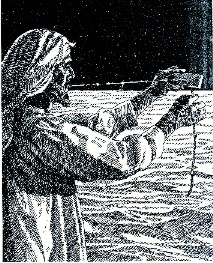Kamal
|
|

|
| A kamal in use |
A kamal is a celestial navigation device that determines latitude. The kamal was used primarily by the Chinese and Arabs in the 18th and 19th century.
The kamal consists of a rectangular wooden card about 2 inches by 1 inch, to which a string with several equally spaced knots is attached through a hole in the middle of the card. The kamal is used by placing one end of the string in the teeth while the other end is held away from the body roughly parallel to the ground. The card is then moved along the string, positioned so the lower edge is even with the horizon, and the upper edge is occluding a target star, typically Polaris because its angle to the horizon does not change with longitude or time. The angle can then be measured by counting the number of knots from the teeth to the card, or a particular knot can be tied into the string if travelling to a known latitude.
The knots were typically tied to measure angles of one finger-width. When held at arm's length, the width of a finger measures an angle that remains fairly similar from person to person. This was widely used (and still is today) for rough angle measurements, an angle known as issabah in Arabic, or a chih in Chinese. By modern measure this is about 1 degree, 36 minutes, and 25 seconds, or just over 1.5 degrees.
Due to the limited width of the card, the kamal was only really useful for measuring Polaris in equatorial latitudes, which perhaps explains why it was not common in Europe. For these higher-latitude needs somewhat more complex devices based on the same principle were used, notably the cross-staff and backstaff.
Kamal could also refer to Kamal Haasan, a Tamil film actor from India
Kamal, an arabic name which means perfection.
Kamal, a Hindi name which means Lotus.
Kamal, is a Malayalam director, who has directed some memorable movies like Megha malhar and Madura Nombara Kaattu
